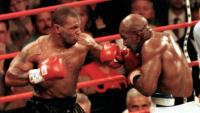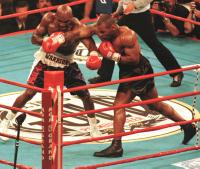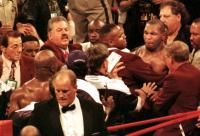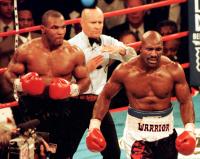Links
• Center
Field
• Love
of the Game
• Timeline
Today
• CF
Media
• E-mail |

The summer of 1997 in sports

BY NATHAN BIERMA
In the
ancient days of American sports, boxing was second
only to baseball, and along
with horse racing, helped provide the
most important sports events
and history of the time. Names such
as Jack Dempsey and Gene Tunney
ingrained themselves into
American society and assured
the Roaring Twenties of their
vivacious adjective.
Its simplicity led America to embrace the
first sport there ever was--two
men, stripped of everything but
shorts and boxing gloves,
hemmed in by the ring in the center of
an arena, with no other
choice but to fight. Today its once
enormous presence in American
culture is evidenced by the phrases
that seeped into our everyday
language--"on the ropes," "throwing
in the towel," "saved by
the bell."
Even as football and basketball
rose to prominence in the
sports scene mid-century,
boxing retained its drama with stars
such as Joe Louis and Sugar
Ray Leonard. Last summer in Atlanta
it was Muhammad Ali who
lit the Olympic torch, his maintained
charisma and zest for life
in the face of a debilitating disease
symbolized by the ever-burning
flame.
But to ignore a steady decline
in America's interest in
boxing the last few decades
is to miss a definitive sports trend.
Boxing has been marred by
widespread corruption, prison sentences
of promoters and fighters,
various organizations whose number
dilutes much meaning from
any one title, and, perhaps most
significantly, lack of bona
fide boxing stars to capture
America's attention along
with the endless parade of superstars
in basketball, baseball,
and football.
 Tyson-Holyfield
II was to be a once-in-a-decade event to Tyson-Holyfield
II was to be a once-in-a-decade event to
combat boxing's many ills.
The first fight, last November,
certainly was, as the supposedly
washed-up Evander Holyfield
scored a twelfth round knockout
of the seemingly invincible Mike
Tyson for the heavyweight
title. It went down as one of the
great sports events of the
year, maybe of the 90's, a monumental
upset for one of boxing's
few great men.
Evander Holyfield seems out
of place in the glitzy,
lucrative, and dehumanizing
world of professional boxing. He
says he found faith after
a miracle-healing by televangelist
Benny Hinn in 1991, and
speaks with intelligence and articulation
uncommon to fighters.
Placards referring to Bible verses are
nothing new to sporting
events, but rare indeed are the boxing
shorts Holyfield wore into
the ring for his Tyson rematch, which
have inscribed vertically,
"Phil 4:13," the Bible verse that says
"I can do everything through
him who gives me strength."
If Holyfield stands out as
unusual, Mike Tyson fits right
in. Rising rapidly
to stardom last decade with his vicious power
and speed, yanked from fight
to fight by zany promoter Don King,
Tyson fell from glory with
a rape conviction and prison sentence.
He steamrolled through his
first four fights out of jail before
surprisingly succumbing
to Holyfield, a twelve round match of
which, he says, he only
remembers three.  It
was a stunning It
was a stunning
defeat and raised questions
about the possibility of his waning
skills and desire at this
stage of his career and his life.
Tyson was married this year
and seemed to be grabbing a foothold
in a life marked by turbulence.
Whether this explained or
further muddied the events
of June 28, 1997, was one of the many
questions left unanswered
after one of the all-time bizarre
occurrences in sports.
 The
first two rounds of the highly-hyped rematch belonged, The
first two rounds of the highly-hyped rematch belonged,
again, to Holyfield.
The third round was more difficult to
assess strictly from a fighting
standpoint, but nobody was. It
started with Mike Tyson
leaving his corner without his
mouthpiece, which Holyfield
noticed and pointed out to the
referee. Tyson was
sent back to retrieve his mouthpiece. But at
one point during the third
round, holding Holyfield, he spit it
out and bit down on Holyfield's
right ear, removing a small piece
of it and spitting it out
while Holyfield jumped around in agony.
While Holyfield retreated,
Tyson, in an equally cowardly move,
shoved his opponent from
behind. After the action had been
halted and then resumed,
Tyson again bit Holyfield, this time on
his left ear. Referee
Mills Lane immediately intervened and
disqualified Tyson
Confusion reigned for hours.
Tyson initially charged
Holyfield's corner and swung
at the police rushing in to the ring
to guard it. Beaten
one-on-one with Holyfield, Tyson now showed
some aggression with a shield
of humanity separating the
fighters. Outside
the arena rumors of gunfire spread through the
departing crowd, inciting
fear of a mass tragedy. The ordinarily
garrulous Don King was now
strangely subdued, mumbling something
about having to "review
the tape" before promptly disappearing,
for once realizing that
meaningless babble could not impeach the
stark reality of what had
just happened.
 Horror
and one-liners marked public reaction. Tyson was Horror
and one-liners marked public reaction. Tyson was
dubbed a madman, animal,
and monster, while naysayers offered
eulogies for the sport of
boxing, no longer worthy, they said, to
be called a sport.
Some found it ironic, though, that a sport
that routinely features
blood and unconsciousness was now being
berated for brutality with
this biting. And then there were the
jokes. Holyfield,
formerly nicknamed The Real Deal, was now
called the Real Meal.
Mike Tyson was nominated for Sportsman of
the Ear. His bite
was a lobe blow. No, Holyfield had not said
"bite me" to Tyson in the
ring. And on and on.
Why did Tyson do it?
What could he possibly have been
thinking as he sunk his
teeth into Holyfield? Hypotheses are few
and unconvincing.
Tyson's immediate explanation was that the
bite was revenge for a head-butt
by Holyfield he said opened up a
gash over his right eye.
"What am I to do? This is a career. I
have to retaliate.
Look at me--my kids will be scared of me."
He disappeared before offering
explanation as to how a one-inch
cut is life threatening
or how gashes scare children but not
disfigured aural appendages
do not.
Two days later Tyson offered
a hollow and predictable apology at the urging of King, the one detail
predictable in this crazy story. But most assumed the
statement was also written
by King to save face, so the world was
left scratching its collective
head. Some surmised that the
biting resulted from a warped
sense of pride on the part of
Tyson; he saw he was going
to get beaten again by Holyfield in
the first two rounds and
decided he would lose the fight on his
own terms. Others
saw this as his escape from the boxing world
that has tossed him around
and considered him a pawn for the
purpose of millions of dollars.
A few buy into Tyson's supposed
explanation from his statement--that
he was caught up in the heat
of the moment and simply
snapped.
Holyfield came out of the
incident smelling like a rose.
His corner restrained him
from retaliating against Tyson for the
bite, preventing a second
fighter from being disqualified and the
sport from sinking to insalvageable
depths. An fan later found
the amputated portion of
Holyfield's ear lying in the ring after
the fight and returned it
to the fighter's room. 20 minutes of
surgery and the ear was
sewn back on. The incident served to
further the good and evil
clash promoted in the Tyson-Holyfield
matchup, with Tyson the
ex-convict and Holyfield the convert to
religion. After this
bout Holyfield had his $35 million and the
adoration and sympathy of
millions more fans for his stinging
ear. He even fit in
some globetrotting, traveling to South
Africa to meet with President
Nelson Mandela.
 Tyson
did not enjoy such post-fight activities, though some Tyson
did not enjoy such post-fight activities, though some
thought he should have been
more miserable. His license was
revoked by the Nevada State
Athletic Commission, which also fined
Tyson the maximum allowable
10 percent, or $3 million, of his
fight earnings. Meanwhile
a bill was working its way through the
state legislature allowing
the fine of an entire purse. It was
too late to hit Tyson, and
so, for his ear-biting embarrassment,
he receives $27 million
dollars, and waits for a possible renewal
of his license in one year.
He wouldn't have boxed for 8-10
months anyway. Many
doubted that this sent a strong enough
message.
Mike Tyson will box again.
Millions of people will watch
him again, and pay lots
of money again. But the memory of what
transpired on June 28 will
not fade away as easily as Tyson's
meager punishment.
Sports, especially boxing, had been violent
before, and ears had been
bitten before, but never on such an
immense and glitzy stage,
for so much money, with so many people
watching, and for so little
apparent reason. The scar on Evander
Holyfield's ear remains,
as does the night of June 28 in the
minds of sports fans everywhere.
They will remember it whenever
they watch a boxing match,
whenever Mike Tyson's name comes up in
the coming years, with his
attempts for license renewal and his
eventual return.  They will remember it whenever sports takes its
They will remember it whenever sports takes its
unfortunate ugly turns--the
bench clearing brawls, the violent
arguments with the referees,
the athletic contact that goes
beyond the incidental to
the personal. And they will remember
that on June 28, 1997, Mike
Tyson, for a few ugly moments,
stooped to something below
athlete, below human, to intentionally
and brutally harm another
human being. And they will remember
that sports reflects men
and women at their worst as well as at
their best. They will
wish Mike Tyson had refrained from
providing such a vivid reminder.
 

The Summer of 1997 in Sports
Hockey:
Triumph and Tragedy
Basketball:
One for the ages, again
Boxing: Dismemberment and disgrace
Golf:
Two tough to take |



